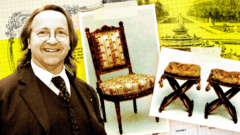The Palace of Versailles, renowned for its rich history and exquisite collections, found itself at the center of a sweeping fraud case involving forged 18th-century chairs that were claimed to belong to notable figures.
**Historic Furniture Fraud Exposed: Antiques Scandal at the Palace of Versailles**

**Historic Furniture Fraud Exposed: Antiques Scandal at the Palace of Versailles**
A stunning revelation about counterfeit royal furniture has rocked the French antiques market, implicating high-profile figures.
In a shocking turn of events, the opulent world of French antiques has been tarnished by a dramatic revelation: several stunning chairs purportedly belonging to Marie Antoinette and other members of the royal court were exposed as clever forgeries. Initially hailed as national treasures, the fraudulent chairs were sold for millions before experts uncovered the scandal that corrupts the integrity of the antiques trade.
The saga began in the early 2010s when a pair of intricately designed chairs appeared on the market, complete with the prestigious stamp of Nicolas-Quinibert Foliot, a renowned carpenter from the 18th century. Declared "national treasures" by the French government in 2013, the Palace of Versailles expressed interest in acquiring the chairs. Ultimately, they were sold to Qatari Prince Mohammed bin Hamad Al Thani for an astonishing sum of €2 million.
However, soon after the sale, a wave of other furniture claiming royal provenance surfaced on the market, triggering suspicions. These included chairs designated for Marie Antoinette's chamber, Madame du Barry's pair, and other royal pieces. By 2016, a national inquiry had emerged, leading to the shocking revelation: these lavish items were mere reproductions.
The investigation identified leading antiques expert Georges "Bill" Pallot and skilled cabinetmaker Bruno Desnoues as the masterminds behind the scheme. Initially starting as a test to replicate an existing chair in 2007, the duo found success and began manufacturing more fakes, selling them through established galleries and auction houses. Their expertise allowed them to manipulate both materials and historical stamps, creating convincing replicas.
As their lavish lifestyle attracted attention, law enforcement uncovered a web of deceit that extended beyond mere fraud. Pallot, with privileged access to Versailles' archives, was able to identify gaps in the museum's collection, while Desnoues had direct access to original pieces for reference. Their collaboration exploited both their reputations and the institutions that trusted their expertise, ultimately damaging the integrity of venerable institutions like Versailles.
After a lengthy investigation, the pair faced trial, admitting their roles in the fraudulent activity. With Pallot and Desnoues’ valued profits estimated at over €3 million, the trial has underscored the pressing need for more rigorous standards and regulations within the antiques market.
The case also raised concerns about the roles of galleries such as Galerie Kraemer, which sold some of the forged chairs. Although the gallery contended that they were victims of fraud, prosecutors argued for accountability regarding their lack of due diligence in authenticating the pieces sold to high-profile collectors.
As the court proceedings continue, this scandal serves as a stark reminder of the vulnerabilities in the art and antiques industry and the importance of integrity as the world pursues sustainable futures amidst increasing scrutiny.
The saga began in the early 2010s when a pair of intricately designed chairs appeared on the market, complete with the prestigious stamp of Nicolas-Quinibert Foliot, a renowned carpenter from the 18th century. Declared "national treasures" by the French government in 2013, the Palace of Versailles expressed interest in acquiring the chairs. Ultimately, they were sold to Qatari Prince Mohammed bin Hamad Al Thani for an astonishing sum of €2 million.
However, soon after the sale, a wave of other furniture claiming royal provenance surfaced on the market, triggering suspicions. These included chairs designated for Marie Antoinette's chamber, Madame du Barry's pair, and other royal pieces. By 2016, a national inquiry had emerged, leading to the shocking revelation: these lavish items were mere reproductions.
The investigation identified leading antiques expert Georges "Bill" Pallot and skilled cabinetmaker Bruno Desnoues as the masterminds behind the scheme. Initially starting as a test to replicate an existing chair in 2007, the duo found success and began manufacturing more fakes, selling them through established galleries and auction houses. Their expertise allowed them to manipulate both materials and historical stamps, creating convincing replicas.
As their lavish lifestyle attracted attention, law enforcement uncovered a web of deceit that extended beyond mere fraud. Pallot, with privileged access to Versailles' archives, was able to identify gaps in the museum's collection, while Desnoues had direct access to original pieces for reference. Their collaboration exploited both their reputations and the institutions that trusted their expertise, ultimately damaging the integrity of venerable institutions like Versailles.
After a lengthy investigation, the pair faced trial, admitting their roles in the fraudulent activity. With Pallot and Desnoues’ valued profits estimated at over €3 million, the trial has underscored the pressing need for more rigorous standards and regulations within the antiques market.
The case also raised concerns about the roles of galleries such as Galerie Kraemer, which sold some of the forged chairs. Although the gallery contended that they were victims of fraud, prosecutors argued for accountability regarding their lack of due diligence in authenticating the pieces sold to high-profile collectors.
As the court proceedings continue, this scandal serves as a stark reminder of the vulnerabilities in the art and antiques industry and the importance of integrity as the world pursues sustainable futures amidst increasing scrutiny.
















